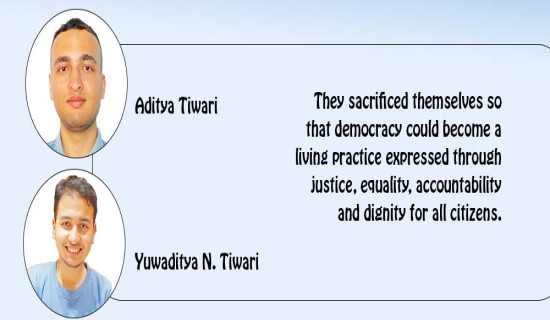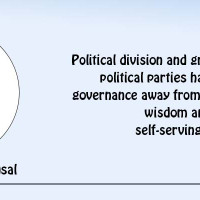- Friday, 30 January 2026
Universities Need Sweeping Reforms
The prospects of academic institutions and universities in Nepal are intricately tied to the nation's socio-economic landscape, including the developmental direction envisioned by federal, provincial and local governments. Thus, a comprehensive review of the developmental priorities and focuses of these governing bodies is crucial to discern the forthcoming actions for academic institutions and universities in Nepal. Since Nepal embraced a Federal Democratic Republic governance system in 2015, the socio-economic and educational sector has undergone a transformation. The new constitution now designates provinces and local municipalities, both urban and rural, as responsible for fundamental service delivery to the populace. Consequently, most service provisions and community-based economic development initiatives are overseen by provincial and local governments.
This decentralisation of authority and resources has bolstered democracy, fortified human development, safeguarded human rights, strengthened federal structures, and enhanced governance. This shift has opened new avenues for provincial and local governments, empowering them to devise and execute their unique development strategies, tailored to meet public expectations. These Provincial and Local Development Plans necessitate a substantial policy reform in education sector to ensure the availability of quality, specialised technical, managerial, and professional personnel in each province.
Human development
Nepal's aspiration for progress hinges on human development. Regarded as the driving force behind national advancement, human capital is in top priority. Exploiting human potential to the fullest is a core tenet among the four national objectives that underpin the goal of prosperous Nepal. This vision necessitates a transition from the prevailing generalized approach to human resource production towards a more specialised, technical orientation that aligns with market demands. Nepal's ambitions include elevating its Human Development Index to 0.620 by 2022 and further to 0.760 by 2043.
Correspondingly, plans involve curbing the unemployment rate from 11.4 per cent in 2018 to 3 percent by 2043, elevating labour force participation from 38.5 per cent in 2018 to 72 per cent by 2043 and augmenting the formal sector's share of total employment from 36.5 per cent in 2018 to 70 per cent by 2043. This roadmap for human development underscores the role of academic institutions and universities in fostering innovation, research, and the production of highly skilled technical, managerial, and entrepreneurial human resources, pivotal for Nepal's socio-economic metamorphosis.
However, the educational sector faces challenges. Political interventions and strikes plague universities, driving students to go abroad for higher education. Urgent action from the government and relevant educational institutions is imperative to address the exodus of Nepali students. Recent data from the Ministry of Education reveals that many students seek to pursue their higher studies in foreign countries, which has drained a huge amount of national wealth. An overwhelming number of students are inclined to general subjects, with technical programmes receiving limited enrollment. Issues such as the neglect of academic calendar implementation, absence of innovation, an overemphasis on curriculum updates, and insufficient focus on research-oriented and employment-centric education persist in universities and colleges.
Universities must develop innovative programmes that align with local, regional, and national human resource needs, particularly in the fields like science, technology, engineering, health sciences, and life sciences. There are many challenges in establishing world-class higher education institutions in Nepal amidst a rapidly evolving global landscape. Universities are mandated to design courses and research initiatives that generate skilled, competitive human resources essential for economic, technological, and national development.
Given governmental priorities, statistics underscore the need for policy reform within the university system. This reform should entail a transition from general subjects to technical disciplines and a shift from traditional class-based instruction to practical, research-based approaches. Inclusion of on-the-job training, leveraging natural resources for a green economy (water, forest, agriculture, and ecotourism), and a focus on the right technology and green jobs are essential for progress.
Gandaki University (GU) is committed to promoting innovation under the trustee model. It is poised to emerge as a dynamic academic hub, producing skilled professionals and leaders for Nepal and beyond. The 2021 education policy of Gandaki Province endorses GU's autonomous status under a Board of Trustees, heralding a paradigm shift in university governance. This innovative approach is designed to cultivate a stream of highly skilled human resources vital for the province and nation's transformation and prosperity.
Autonomous status
In conclusion, existing universities, including Tribhuvan University (TU) require reform to offer pioneering programmes in areas such as science, technology, artificial intelligence, climate change, sustainable development, engineering, health sciences, green economy and life sciences. Granting these institutions autonomous status is the key to addressing local, provincial, and national human resource demands. A critical step in the governance reform is the appointment of a full-time Academic Chancellor, made possible through the board of trustees, which aims to shield universities from political interference.
The Gandaki University (GU) governance model that keeps abreast of ongoing global trends, offers an innovative structure for the next decade that can guide Nepal's university reforms. This approach accommodates the country's evolving socio-economic landscape, reflecting our aspirations for a prosperous nation bolstered by quality human resources, both domestically and globally.
(Dr. Devkota is former Vice-Chancellor of National Planning Commission Nepal)

















